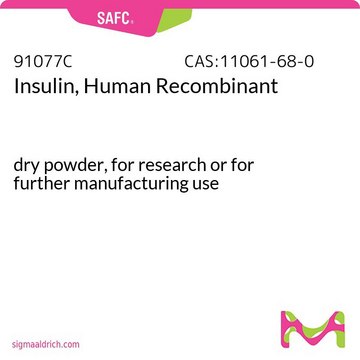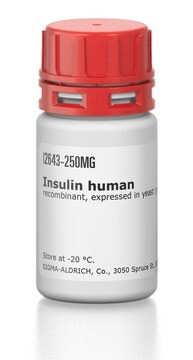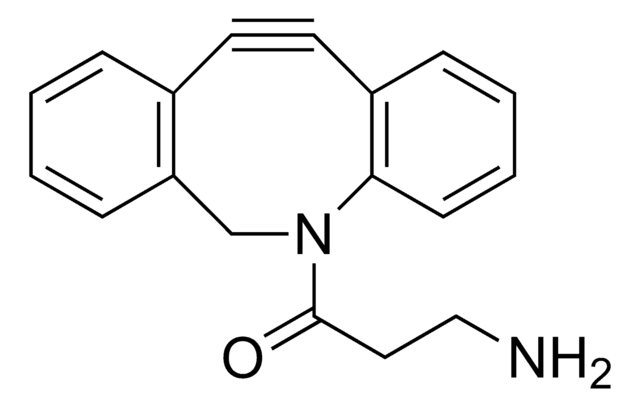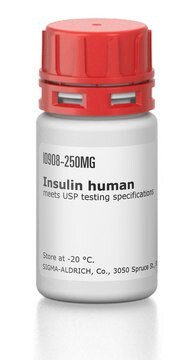SRP0221
PTPIA2 Active human
recombinant, expressed in E. coli, ≥90% (SDS-PAGE)
Synonim(y):
ICA512, Islet cell antigen 2, PTPRN, Protein tyrosine phosphatase-like N, R-PTP-N
Zaloguj sięWyświetlanie cen organizacyjnych i kontraktowych
About This Item
Kod UNSPSC:
12352200
NACRES:
NA.32
Polecane produkty
pochodzenie biologiczne
human
rekombinowane
expressed in E. coli
Próba
≥90% (SDS-PAGE)
Formularz
aqueous solution
masa cząsteczkowa
58.8 kDa
opakowanie
pkg of 20 μg
warunki przechowywania
avoid repeated freeze/thaw cycles
stężenie
>0.02 mg/mL
numer dostępu NCBI
numer dostępu UniProt
Warunki transportu
dry ice
temp. przechowywania
−70°C
informacje o genach
human ... PTPRN(5798)
Opis ogólny
Białkowa fosfataza tyrozynowa. (PTP-IA2, ICA-512), domena katalityczna, (aminokwasy 693-979), (nr akcesyjny banku genów NM_002846), z N-końcowym znacznikiem GST, MW = 58,8 kDa, wyrażona w systemie ekspresji E. coli.
PTPRN (protein tyrosine phosphatase, receptor type N), bardziej znane jako IA-2 (insulinoma-associated protein 2), jest białkiem transmembranowym z rodziny PTP. Zostało ono początkowo zidentyfikowane jako główny autoantygen w cukrzycy typu 1. W komórkach neuroendokrynnych znajduje się w ziarnistościach wydzielniczych. Jest to białko wielodomenowe z domenami wewnątrzkomórkowymi, transbłonowymi i zewnątrzkomórkowymi, a jego region wewnątrzkomórkowy zawiera domenę pseudokatalityczną. Podczas swojego cyklu życiowego jest wielokrotnie przetwarzany, a jego różne części są narażone na różne regiony komórkowe i tkankowe, takie jak jądro, cytozol, światło organellarne w szlaku wydzielniczym, zewnątrzkomórkowa przestrzeń wysepek trzustkowych i przedziały błonowe. Gen ten jest zlokalizowany na ludzkim chromosomie 2q35 i koduje białko o długości 979 reszt.
Zastosowanie
Przydatny do badania kinetyki enzymów, regulacji i defosforylacji docelowych substratów.
Działania biochem./fizjol.
PTPRN (białkowa fosfataza tyrozynowa, receptor typu N) jest rozszczepiana w domenie cytozolowej podczas wydzielania insuliny. Domena cytozolowa jest przenoszona do jądra, gdzie promuje transkrypcję genu insuliny. Białko to odgrywa ważną rolę w wydzielaniu hormonów i neuropeptydów. Białko to ma kluczowe znaczenie w kontrolowaniu liczby pęcherzyków gęstego rdzenia w komórkach β oraz indukowanego glukozą i podstawowego uwalniania insuliny. Myszy PTPRN null wykazują zmniejszoną liczbę gęstych pęcherzyków rdzeniowych (DCV), nieprawidłowe wydzielanie insuliny, niepłodność samic, zmiany behawioralne i dysregulację okołodobową.
Definicja jednostki
One unit will hydrolyze 1 pmol 6, 8-difluoro-4-methyl umbelliferyl phosphate (DiFMUP) per minute at pH 6.3 and 30°C.
Postać fizyczna
Formuła w 25 mM Tris-HCl, pH 8,0, 75 mM NaCl, 0,05% Tween-20, 50% glicerolu, 2 mM EDTA, 1 mM DTT i 10 mM glutationu.
Uwaga dotycząca przygotowania
Thaw on ice. Upon first thaw, briefly spin tube containing enzyme to recover full content of the tube. Aliquot enzyme into single use aliquots. Store remaining undiluted enzyme in aliquots at -70°C. Note: Enzyme is very sensitive to freeze/thaw cycles.
Ta strona może zawierać tekst przetłumaczony maszynowo.
Wybierz jedną z najnowszych wersji:
Certyfikaty analizy (CoA)
Lot/Batch Number
Nie widzisz odpowiedniej wersji?
Jeśli potrzebujesz konkretnej wersji, możesz wyszukać konkretny certyfikat według numeru partii lub serii.
Masz już ten produkt?
Dokumenty związane z niedawno zakupionymi produktami zostały zamieszczone w Bibliotece dokumentów.
Structure of the mature ectodomain of the human receptor-type protein-tyrosine phosphatase IA-2.
Primo ME
The Journal of Biological Chemistry, 283, 4674-4681 (2008)
The dense core transmembrane vesicle protein IA-2 is a regulator of vesicle number and insulin secretion.
Harashima S
Proceedings of the National Academy of Sciences of the USA, 102, 8704-8709 (2005)
Tao Cai et al.
Acta diabetologica, 52(3), 573-580 (2014-12-22)
IA-2 is a transmembrane protein found in the dense-core vesicles (DCV) of neuroendocrine cells and one of the major autoantigens in type 1 diabetes. DCV are involved in the secretion of hormones (e.g., insulin) and neurotransmitters. Stimulation of pancreatic β
María E Primo et al.
PloS one, 6(9), e24191-e24191 (2011-09-22)
ICA512 (or IA-2) is a transmembrane protein-tyrosine phosphatase located in secretory granules of neuroendocrine cells. Initially, it was identified as one of the main antigens of autoimmune diabetes. Later, it was found that during insulin secretion, the cytoplasmic domain of
Nasz zespół naukowców ma doświadczenie we wszystkich obszarach badań, w tym w naukach przyrodniczych, materiałoznawstwie, syntezie chemicznej, chromatografii, analityce i wielu innych dziedzinach.
Skontaktuj się z zespołem ds. pomocy technicznej








